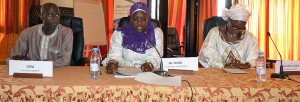
Senegal has established itself as one of only a few nations to develop a national Climate Change Adaptation Plan specifically for marine fisheries. High-level U.S. and Senegalese government representatives launched the plan in October with the goal of helping the sector and its fisheries communities to cope with the negative impacts of climate change and climate variability.
A partnership of the Ministry of Environment and the Ministry of Fisheries spearheaded the development of this plan with support from USAID, through its fisheries project, USAID/COMFISH, implemented by the Coastal Resources Center at the University of Rhode Island’s Graduate School of Oceanography along with local partners.
Like other key sectors of the Senegalese economy, the fisheries sector is hard hit by climate change. Manifestations of climate change in this sector include changes in fish location and migration patterns, increasing climate variability and number of accidents at sea, coastal erosion affecting fishing communities and landing sites, and flooding.
This national plan is part of a long process that will help the entire fisheries sector in Senegal better adapt to climate change by helping to increase the resilience of coastal/fishing communities. Fisheries play a critical role in the Senegalese economy. This sector involves over 17 percent of the working force, contributes over 2.5 percent to GDP and is one of the main sources of animal protein (over 70 percent) in the diet of the Senegalese people.
Since its inception in 2011, the USAID/COMFISH Project has been working with the Government of Senegal to assess the vulnerability of coastal communities, strengthen the capacity of local actors and institutions in the fisheries and climate change sectors while helping communities plan and undertake proactive adaptation actions to climate change.


